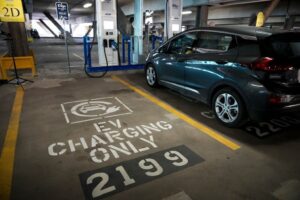Washington state, like other liberal areas, has been pushing its citizens to switch to electric vehicles (EVs), and has now discovered one big problem with the change: How does it make up for lost gas tax revenue? As of 2022, residents of the Evergreen State were paying a tax of 49.4 cents per gallon, but with more people going green, less drivers are forking over the cash. What’s the solution? Lawmakers are trying to push a bill through that would saddle motorists with a per-mile Road Usage Charge (RUC).
The Pay-Per-Mile Gas Tax Proposal
Last week, the state’s House Transportation Committee met to discuss the dwindling budget for such things as road repairs and maintenance due to loss in revenue as Washington drivers switch to EVs. Committee Chair Jake Fey, a Democrat, said, “Gasoline revenues are headed downward.” House Bill 1832, if passed, will require drivers to pay 2.5 cents per mile on publicly funded roads such as state highways, interstates, and city- and county-maintained roads. Private roads, at least, would not be included in the bill.
The proposed legislation is getting a lot of negative feedback, though, with people pointing out everything from a breach of the state’s 18th Amendment and equal distribution of residents to difficulties in keeping track of miles driven. Mariya Frost of the Washington Policy Center pointed out:
“This cap would be especially problematic in the context of equity. Most electric vehicles in the state are registered in western Washington in wealthy zip codes. This bill is not a good approach to implementing RUC policy in Washington state and would create significant funding and equity problems.”
Frost also listed other concerns such as how to tax out-of-state drivers using the roads. Seattle, especially, is a huge tourist area with millions of visitors each year. It is also a gateway to Alaska and a port for luxury cruises. On the flip side, how can legislators exclude the miles Washingtonians travel outside the state? Depending on where one lives, Canada is just a couple of hours away and thousands commute to Portland, OR, for work every day. Frost also points to the issue of privacy invasion, since GPS trackers could be used to monitor overall mileage for individuals.
Many of those opposing the legislature cited Washington’s 18th Amendment which, as The Center Square explained, “restricts the expenditure of gas tax and vehicle license fees deposited into the motor vehicle fund to ‘highway purposes.’” Mike Ennis, government affairs director at the Association of Washington Business, says “revenue” is not protected by the Amendment. If the gas tax is to be replaced by a road use charge, then it needs to be treated the same way, with protections under the Amendment, otherwise, money could be spent on things other than road maintenance and what the gas tax was originally implemented for in the first place. He added:
“The Legislature has a long history of sweeping funds for other uses. Protecting the RUC for highway expenditures directly ties the per mile rate to actual road usage, thus providing much needed legitimacy to a new funding source that will be viewed skeptically by the public. And if you doubt that, I would encourage you to pull up the 46 pages of folks who have signed in in opposition to this bill.”

(Photo by Drew Angerer/Getty Images)
There were only three people who testified to the committee in support of the bill. One was Jefferson County resident Tom Thiersch who claimed the arguments using the 18th Amendment didn’t make sense. “That’s just a false premise for opposing this bill,” he opined. “Even if it were put into the bill, it could just as easily be changed by future legislation, so what’s the point?”
In their bid to go green and appease the progressives who swear electric vehicles will save the environment, lawmakers are discovering some negative effects they may not have taken into consideration. One way to make politicians stop and take a hard look at something is to show them how they’re losing money and revenues.
Planned to officially begin on Jan. 1, 2030, volunteers could start participating as early as 2026. EV owners would get a break and will qualify for refunds on licensing fees, though, saving them a couple of hundred dollars a year.




